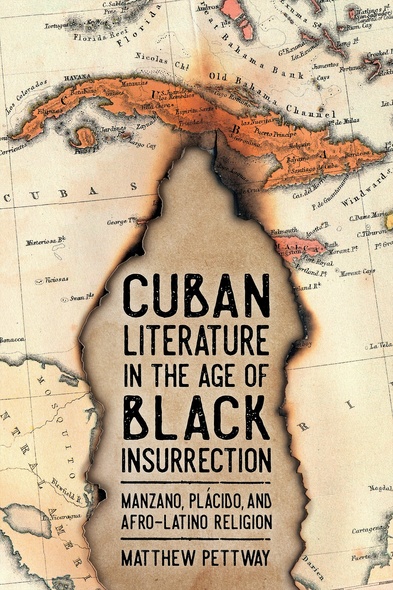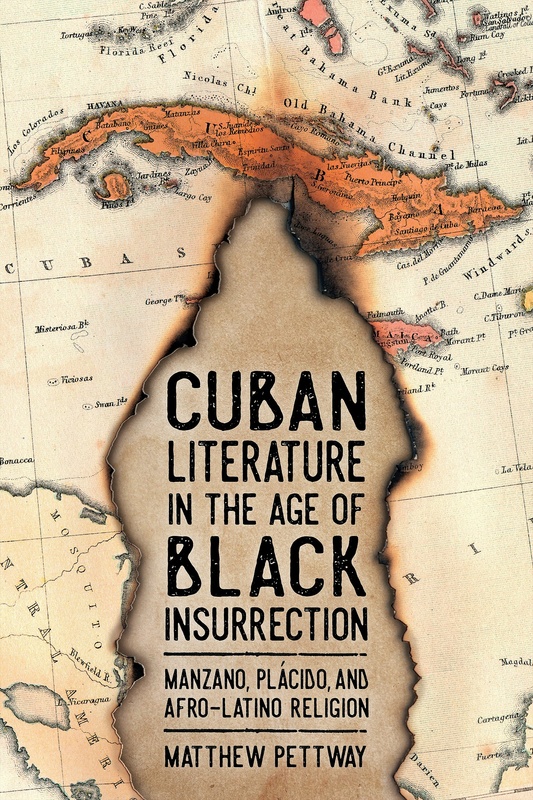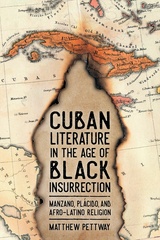
Cuban Literature in the Age of Black Insurrection
Manzano, Plácido, and Afro-Latino Religion
Juan Francisco Manzano and Gabriel de la Concepción Valdés (Plácido) were perhaps the most important and innovative Cuban writers of African descent during the Spanish colonial era. Both nineteenth-century authors used Catholicism as a symbolic language for African-inspired spirituality. Likewise, Plácido and Manzano subverted the popular imagery of neoclassicism and Romanticism in order to envision black freedom in the tradition of the Haitian Revolution.
Plácido and Manzano envisioned emancipation through the lens of African spirituality, a transformative moment in the history of Cuban letters. Matthew Pettway examines how the portrayal of African ideas of spirit and cosmos in otherwise conventional texts recur throughout early Cuban literature and became the basis for Manzano and Plácido’s antislavery philosophy. The portrayal of African-Atlantic religious ideas spurned the elite rationale that literature ought to be a barometer of highbrow cultural progress.
Cuban debates about freedom and selfhood were never the exclusive domain of the white Creole elite. Pettway’s emphasis on African-inspired spirituality as a source of knowledge and a means to sacred authority for black Cuban writers deepens our understanding of Manzano and Plácido not as mere imitators but as aesthetic and political pioneers. As Pettway suggests, black Latin American authors did not abandon their African religious heritage to assimilate wholesale to the Catholic Church. By recognizing the wisdom of African ancestors, they procured power in the struggle for black liberation.
In Cuban Literature in the Age of Black Insurrection: Manzano, Plácido, and Afro-Latino Religion, Matthew Pettway presents an essential reframing of the lives and works of two renown AfroCuban writers, reconnecting their writing with the African Atlantic context from which it should never have been disconnected.
Cuban Literature in the Age of Black Insurrection leaves a lasting impression and challenges those who write about African diasporic literatures to approach the literary archive with care—to attend to the lives of Afro-descended authors like Manzano and Plácido while patiently assessing their writing beyond the frames and tropes found in European literary traditions.
Pettway’s work offers an example of the challenges and rewards of the recontextualization of classic works and authors. This mission is relevant not only for literary scholars, but for all scholars of the African Diaspora, and for any scholar, anthropologist, historian, or other, engaged in the writing and re-writing of social histories. In Cuban Literature in the Age of Black Insurrection: Manzano, Plácido, and Afro-Latino Religion, Matthew Pettway presents an essential reframing of the lives and works of two renown AfroCuban writers, reconnecting their writing with the African Atlantic context from which it should never have been disconnected.
This disjunction between audience and scope is ultimately noteworthy precisely because this exciting frst book deserves to reach a much broader range of readers than it anticipates . . . I would argue that his Afrocentric analysis of Manzano and Plácido models an innovative research methodology and reading practice with broad application for the studies of the Black diaspora and Latin America.
Pettway deliberately puts Africa back into the practice of Black liberation in Cuba and challenges previous notions that Plácido and Manzano represented mulattos who repudiated their African religious heritage. Pettway establishes that depictions of them as mulattos are problematic and whitewash their efforts of Black liberation. Furthermore, in putting Africa back into Black liberation, he adds to our understanding of Black resistance throughout the Americas.
Pettway’s rich and original interdisciplinary analysis—integrating historical, anthropological, critical literature, and religious studies—makes an invaluable contribution to the construction of a new epistemological framework that seeks to understand the plural and heterogeneous cultures of the Caribbean.
Perception is reality. In this wonderful book, Matthew Pettway opens up the hidden codes of our Afro-Hispanic cosmological perception of reality, one that since the age of slavery has given the Afro-Hispanic/Afro-Latino world tools for resistance, redefinition of ourselves and our history, and envisioning the future. In Cuban Literature in the Age of Black Insurrection, Pettway contextualizes the poems of Plácido and the autobiography and poems of Juan Francisco Manzano in a deeply researched historical and cosmogonic context. Thus, these canonical texts of classical Afro-Diasporic literature come to life, recuperating their potency as generators of a symbolism and a way of understanding time, nature, freedom and ancestry that survived colonialism, slavery and the ongoing age of white supremacy. It is a wonderful book.
Cuban Literature in the Age of Black Insurrection: Manzano, Plácido, and Afro-Latino Religion is a necessary exploration into Afro-Atlantic studies. This research is a form of literary archeology that sits at the nexus of interdisciplinary scholarship. This book uses history, religion, and literary criticism to interrogate the Latin Diaspora and the associated assumptions about empire, specifically white supremacy in Cuba. In kind, the book demonstrates how insistent liberation was among the African population, both indentured and free. Likewise, Pettway’s research demonstrates how influential African religious practices and the success of the Haitian Revolution were on the collective consciousness of Africans exerting political power in the New World.
Cuban Literature in the Age of Black Insurrection: Manzano, Plácido, and Afro-Latino Religion is a necessary book for our times, one that convincingly argues for a place for the two leading Cuban poets of the nineteenth century, Juan Francisco Manzano and Gabriel de la Concepción ‘Plácido’ Valdés in the Cuban literary canon. Both of African descent, Manzano and Plácido were radical thinkers whose discursive leanings were steeped in African religiosity cloaked in Western canonical tropes of Catholicism and Greco-Roman deities. In turn a historical, theological, and literary study, Pettway here establishes these two men as intellects worthy of more concerted focus nearly two hundred years after their deaths.
This book is an original study on the influence of religion in the writings of two nineteenth-century Cuban writers, that although very recognized and studied, have not been analyzed from the point of view of religion (Catholicism and African influenced). Pettway’s analysis of Afro-Atlantic syncretism and the ways it intersects with literature, writing, and poetry is excellent. This book will be of interest to students and scholars in Cuban studies, Caribbean studies, religious studies and African Diaspora studies.
Matthew Pettway is assistant professor of Spanish at University of South Alabama. Pettway has published articles in PALARA (Publication of the Afro-Latin/American Research Association), Zora Neale Hurston Forum, American Studies Journal, and Del Caribe in addition to entries in The Dictionary of Caribbean and Afro-Latin American Biography. He also contributed the inaugural essay to the volume Black Writing, Culture, and the State in Latin America.






